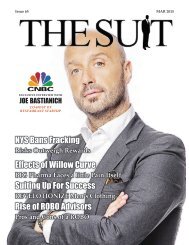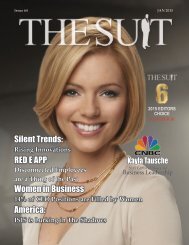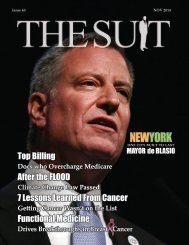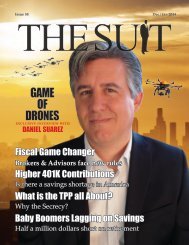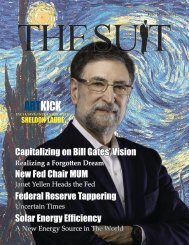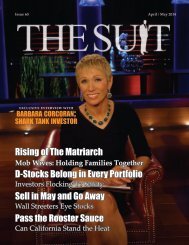o_19grqq7snim9mn019q11f7ds26a.pdf
Marcus Lemonis, a serial entrepreneur and host of the show “The Profit” on CNBC, is a true survivor in the corporate world. The native-born Lebanese business man endured the chaos of a civil war in Beirut and eventually moved to Miami. Lemonis was exposed to the automotive industry throughout his upbringing - his grandfather owning two of the largest Chevrolet dealerships in the United States and Lee Iacocca serving as the family friend and later mentor to Lemonis. On page 12, we conducted an interview with “Profit” host Marcus Lemonis, who offers struggling small businesses capital investment and his expertise in exchange for an ownership stake in the company. In the latter part of the magazine, we interviewed countless wealth advisors during these tough economic times. We recognize that some of the changes in 2013 and 2014 require relevance for financial planners. Therefore, the financial industry continues to push for more realistic standards and reforms.
Marcus Lemonis, a serial entrepreneur and host of the show “The Profit” on CNBC, is a true survivor in the corporate world. The native-born Lebanese business man endured the chaos of a civil war in Beirut and eventually moved to Miami. Lemonis was exposed to the automotive industry throughout his upbringing - his grandfather owning two of the largest Chevrolet dealerships in the United States and Lee Iacocca serving as the family friend and later mentor to Lemonis. On page 12, we conducted an interview with “Profit” host Marcus Lemonis, who offers struggling small businesses capital investment and his expertise in exchange for an ownership stake in the company. In the latter part of the magazine, we interviewed countless wealth advisors during these tough economic times. We recognize that some of the changes in 2013 and 2014 require relevance for financial planners. Therefore, the financial industry continues to push for more realistic standards and reforms.
You also want an ePaper? Increase the reach of your titles
YUMPU automatically turns print PDFs into web optimized ePapers that Google loves.
nia cities reveals still lower minimum<br />
wages than the new Seattle ordinance<br />
requires. Workers in San Jose currently<br />
make a minimum of $10.15 per hour.<br />
Pay for workers in Richmond, California,<br />
which is located northeast of the<br />
San Francisco Bay area on the eastern<br />
shores of San Pablo Bay, is slated to be<br />
$12.25 in March 2105 and $13 by 2018.<br />
Yet comparing Seattle to Richmond is<br />
unfair from a population standpoint. In<br />
2012, Seattle had just shy of 635,000 residents.<br />
Richmond’s count for the same<br />
time period was just short of 107,000 –<br />
which incidentally is close to the number<br />
of Seattle workers, approximately<br />
100,000, researchers from the Evans<br />
School of Public Affairs at the University<br />
of Washington in Seattle identified<br />
as earning less than $15 an hour.<br />
The UW researchers – commissioned<br />
by the Seattle City Council – determined<br />
that part-time workers (20 hours<br />
per week) would earn an additional<br />
$2,912, which is a 30 percent increase,<br />
if hourly pay was raised to $12.12 per<br />
hour. At $15 an hour, that same parttime<br />
worker would see a 61 percent<br />
increase in their pay as they earned an<br />
additional $5,907. At $12.12, full-time<br />
workers would earn $5,600 more. At<br />
$15 an hour, full-time workers would<br />
earn $11,360 more.<br />
That’s a big increase in payroll leaving<br />
Seattle business owners’ wondering<br />
just how is this new minimum<br />
wage going to work out from the fiscal<br />
“trying to stay in business” perspective?<br />
According to Forward Seattle, a business<br />
group representing restaurants,<br />
retailers and other miscellaneous businesses,<br />
it won’t. Forward Seattle contends<br />
$15 an hour will cripple what<br />
businesses choose to remain within<br />
city limits as the measure is implemented.<br />
The group submitted just fewer<br />
than 20,000 signatures to the Seattle<br />
City Clerk the first week of July in an<br />
effort to get a repeal of the municipal<br />
law on the ballot for the November<br />
election. As 16,510 valid signatures are<br />
required for ballot inclusion, it appears<br />
the issue may go before the general<br />
voters instead of only the nine members<br />
of the city council whom unanimously<br />
passed the measure on June 2,<br />
2014, after months of discussion by a<br />
committee of business and labor leaders<br />
organized by Seattle’s mayor, Ed<br />
Murray.<br />
“Right now, the (city) ordinance on<br />
the table we think is going to be pretty<br />
damaging to the city from the business<br />
perspective, and from the workers’<br />
perspective,” Angela Cough told the<br />
Chicago Tribune.<br />
Cough is co-owner of the Flying<br />
Apron Gluten Free and Vegan Bakery<br />
in Seattle’s Fremont district and the<br />
co-chair of Forward Seattle. She isn’t<br />
against raising minimum wage, but<br />
believes $12.50 an hour is more reasonable.<br />
She told National Public Radio<br />
based in Seattle that merchants have<br />
no idea what is going to happen as a<br />
result of this ordinance mandating $15<br />
an hour by 2021 with the next bar of<br />
$17.25 being in place by 2024.<br />
Seattle’s new minimum wage is also<br />
significantly higher than the lowest<br />
hourly wages required in the rest of the<br />
state. Yet, at $9.32 per hour, Washington<br />
State has one of the nation’s highest<br />
state minimum hourly wages with the<br />
$8 an hour required in Massachusetts<br />
coming in at a very distant second.<br />
THE SUIT MAGAZINE p.9




